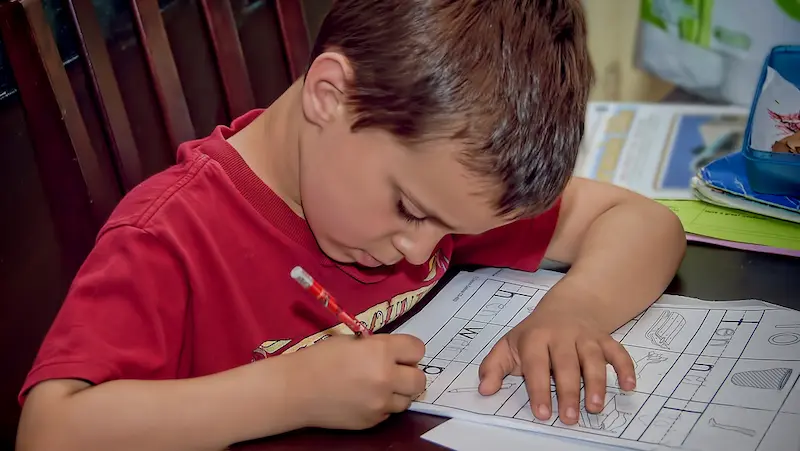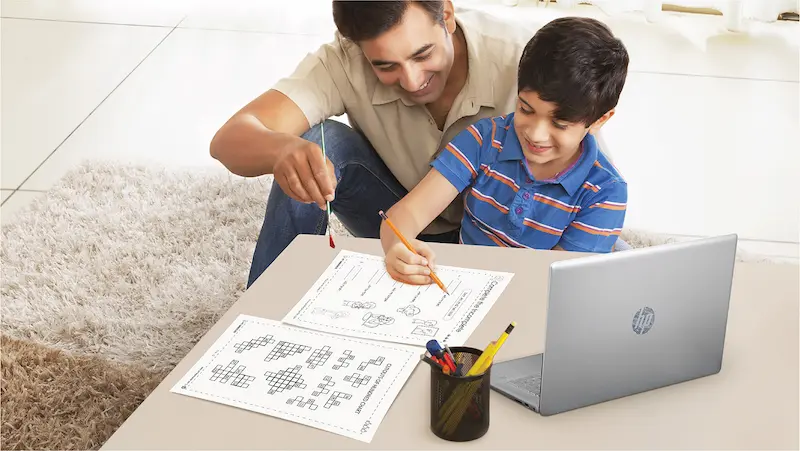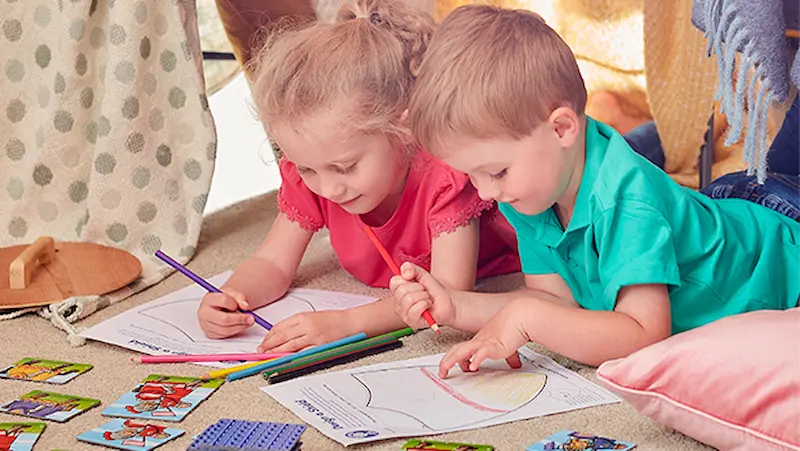Are you looking for engaging and educational activities to keep your kids entertained and learning at the same time? Look no further than fun and educational worksheets!
These versatile tools provide an interactive and hands-on approach to learning, covering a wide range of subjects such as math, language art projects for kids, science, and more. Get ready to watch your little ones thrive as they embark on a fun-filled learning adventure!
Table of contents
Introduction
Engaging in educational activities is crucial for a child’s development as it promotes cognitive, social, and emotional growth. Educational worksheets, in particular, offer a structured and systematic approach to learning, enabling kids to grasp key concepts and reinforce their knowledge effectively.
This blog is dedicated to providing parents with a wide range of engaging and effective resources in the form of fun and educational worksheets. Educational Worksheets align with curriculum standards and incorporate interactive elements, captivating visuals, and age-appropriate content to make learning games for kids enjoyable and impactful for children of different ages and learning styles.
Whether it’s practicing math skills, improving reading for kids comprehension, or exploring science projects for kids, our goal is to empower parents with the tools they need to support their child’s education and make learning an exciting adventure.

Overview of Worksheets
There is a wide variety of worksheets available for kids that are not only educational but also interactive and fun, providing numerous benefits for children’s learning. Here are some types of worksheets worth exploring:
1. Math Worksheets: These worksheets focus on numerical operations, problem-solving, and critical thinking. Interactive math worksheets often include puzzles, games for kids to play, and colorful visuals, making learning math enjoyable and engaging. They enhance children’s number sense, logical reasoning, and computational skills.
2. Language Arts Worksheets: These worksheets aim to improve reading, writing, grammar, and vocabulary skills. They may include activities such as word puzzles, sentence completion, storytelling, and creative writing prompts. By fostering language proficiency, these worksheets enhance communication, literacy, and cognitive abilities.
3. Science Worksheets: Science worksheets encourage curiosity and exploration. They cover topics like the human body, plants, animals, and natural phenomena. These worksheets often incorporate experiments, observation tasks, and hands-on activities, promoting scientific thinking, observation skills, and a deeper understanding of the world.
4. Social Studies Worksheets: These worksheets help children develop an understanding of history, geography, culture, and society. They may include map reading, historical events, biographies, and cultural exploration. By engaging with social studies worksheets, children gain knowledge about different cultures, enhance their critical thinking, and develop empathy and cultural awareness.
5. Critical Thinking Worksheets: These worksheets challenge children to think analytically and creatively. They involve activities like puzzles, riddles, logic problems, and brain teasers. By solving these worksheets, children improve their problem-solving skills, logical reasoning, and decision-making abilities.
The interactive and fun nature of these worksheets not only keeps children engaged but also provides hands-on learning experiences. They promote active participation, stimulate curiosity, and encourage independent thinking.
Additionally, interactive elements like colorful visuals, games, and puzzles make learning enjoyable, boosting motivation and retention of information. Ultimately, these engaging worksheets support children’s overall cognitive development, foster a love for learning, and nurture essential skills for their academic success and personal growth.

Age Group Segmentation
Different age-group segmentation is as follows-
Preschool (Ages 3-5)
Preschool-aged children have unique needs and learning goals that are focused on developing foundational skills. Worksheets for this age group often emphasize the following areas:
1. Alphabet and Phonics: Preschoolers benefit from worksheets that introduce letter recognition, letter-sound correspondence, and basic phonics. These activities lay the groundwork for reading readiness.
2. Numbers and Counting: Worksheets that introduce numbers, counting, and basic math concepts (such as shapes, sizes, and patterns) help preschoolers develop early numeracy skills.
3. Fine Motor Skills: Worksheets that involve tracing lines, shapes, and simple figures promote the development of fine motor skills and hand-eye coordination.
Elementary (Ages 6-10)
Elementary-aged children are expanding their knowledge and skills across various subjects. Worksheets for this age group focus on:
1. Math and Problem Solving: Worksheets cover arithmetic operations, fractions, decimals, geometry, and basic problem-solving strategies to strengthen mathematical abilities.
2. Reading and Writing: Worksheets for elementary students emphasize reading comprehension, vocabulary development, grammar, spelling, and basic writing skills.
3. Science and Social Studies: Worksheets introduce scientific concepts, exploratory activities, and basic social studies topics to foster curiosity, critical thinking, and understanding of the world.
Check robotics for kids 5 year old.
Middle School (Ages 11-14)
At the middle school level, children are transitioning to more complex academic concepts. Worksheets for this age group target:
1. Advanced Math: Worksheets cover topics like algebra, geometry, statistics, and more advanced problem-solving skills to enhance mathematical proficiency.
2. Reading Comprehension and Writing: Worksheets focus on developing higher-level reading comprehension, critical analysis, literary analysis, and expository writing skills.
3. Science and Social Studies: Worksheets delve into more specialized topics in areas such as biology, chemistry, physics, history, geography, and civics, stimulating deeper understanding and critical thinking.
Additionally, interactive elements, age-appropriate graphics, and engaging activities are incorporated into worksheets for each age group to maintain interest and motivation.
By tailoring worksheets to the specific needs and learning goals of each age group, parents and educators can provide targeted educational support, scaffold learning experiences, and foster continuous growth and development in children throughout their academic journey.

Topic-Based Worksheets
Here are subsections for different subjects along with a brief description of each topic and the corresponding worksheets available for kids:
Math
1. Number Sense and Operations: Worksheets cover counting, number recognition, basic operations (addition, subtraction, multiplication, division), and problem-solving.
2. Geometry: Worksheets introduce shapes, angles, symmetry, and spatial reasoning through activities like identifying shapes, measuring angles, and solving geometric puzzles.
3. Fractions and Decimals: Worksheets focus on understanding and working with fractions and decimals, including comparing, converting, and performing operations with them.
4. Measurement and Data: Worksheets explore concepts related to measurement (length, weight, time, etc.) and data analysis (graphing, interpreting charts, and tables).
Language Arts
1. Phonics and Reading: Worksheets help children develop phonemic awareness, decoding skills, sight word recognition, reading fluency, and comprehension through activities like phonics exercises, reading passages, and comprehension questions.
2. Vocabulary and Spelling: Worksheets focus on expanding vocabulary, spelling practice, word formation, context clues, and understanding word meanings.
3. Grammar and Writing: Worksheets cover grammar rules, sentence structure, punctuation, parts of speech, and various writing genres, encouraging proper grammar usage and enhancing writing skills.
4. Reading Comprehension: Worksheets provide passages followed by questions that assess reading comprehension skills, including inferencing, summarizing, and analyzing text.
Science
1. Life Science: Worksheets introduce topics such as plants, animals, human body systems, habitats, and ecosystems, promoting understanding of living organisms and their interactions.
2. Physical Science: Worksheets explore concepts related to matter, energy, forces, motion, and simple machines, fostering scientific thinking and experimentation.
3. Earth and Space Science: Worksheets focus on geology, weather, space exploration, and celestial bodies, encouraging children to explore and understand the world around them.
Social Studies
1. Geography: Worksheets cover maps, continents, countries, states, and landmarks, enhancing spatial awareness and knowledge of different regions.
2. History: Worksheets introduce historical events, influential figures, timelines, and cultural traditions, helping children develop an appreciation for the past and a broader understanding of societies.
3. Civics: Worksheets focus on government systems, citizenship, rights and responsibilities, and democratic principles, nurturing active participation and informed decision-making.
These are just a few examples, as each subject has a wide range of topics that can be explored through engaging and educational worksheets.

Printable Resources
Printing worksheets for offline use can be a convenient way for parents to access and utilize educational resources. Here are some instructions and recommendations for printing and organizing the worksheets effectively:
1. File Formats: Check the file format of the worksheets. Most commonly, worksheets are provided in PDF format, which ensures consistent formatting across different devices and printers. Ensure you have a PDF reader installed on your computer.
2. Printing Setup: Set up your printer and ensure it is connected and properly functioning. Adjust the print settings to optimize the quality and appearance of the worksheets. Consider using color printing if available, as colorful visuals can enhance engagement.
3. Selecting Pages: If the worksheet collection is extensive, you may want to select specific pages to print instead of printing the entire document. This allows you to focus on particular topics or exercises that are most relevant to your child’s needs and learning goals.
4. Paper and Ink: Use good-quality printer paper to ensure the durability and legibility of the worksheets. Check your ink or toner levels to avoid interruptions during the printing process. Consider keeping extra supplies on hand to avoid running out at inconvenient times.
5. Organizing the Worksheets: Once printed, establish an organized system to manage and store the worksheets effectively. Options include using folders, binders, or filing systems. Categorize the worksheets by subject, grade level, or specific topics, making it easier to locate and access them when needed.
6. Accessibility: Consider creating a designated space for the printed worksheets where your child can easily access them. This encourages independence and allows them to engage with the resources whenever they need or want to practice.
7. Regular Updates: As your child progresses or moves to the next grade level, periodically review and update the printed worksheets to ensure they align with their current educational needs. This way, you can provide them with appropriate and engaging resources at each stage of their learning journey.
By following these instructions and recommendations, parents can efficiently print and organize the worksheets, ensuring easy access and utilization for offline learning.

For more information about robotics for kids. Click here!
Tips for Parents
Here are some tips and guidance for parents to make the most of the worksheets and create a conducive learning environment at home:
1. Set a Schedule: Establish a consistent schedule for worksheet activities. Designate specific times during the day when your child can engage with the worksheets, ensuring a routine that fosters focus and consistency.
2. Provide Guidance and Support: While worksheets are often designed for independent work, be available to provide guidance and support when needed. Offer explanations, clarify instructions, and encourage your child to ask questions or seek assistance when facing challenges.
3. Break it Down: Break longer worksheets or activities into smaller manageable chunks. This helps prevent overwhelm and maintains your child’s engagement and motivation throughout the learning session.
4. Celebrate Progress: Acknowledge and celebrate your child’s efforts and progress. Offer praise, encouragement, and positive reinforcement as they complete worksheets or achieve milestones. This cultivates a positive learning environment and boosts your child’s confidence and enthusiasm.
5. Incorporate Variety: Supplement worksheets with other learning activities to provide a well-rounded educational experience. Combine hands-on experiments, educational games, online resources, and real-world applications to enhance learning and keep it engaging and dynamic.
6. Create a Distraction-Free Zone: Designate a quiet and well-lit area for your child’s worksheet activities. Minimize distractions by removing electronic devices, turning off the TV, and ensuring a peaceful environment that allows them to concentrate and focus on their work.
7. Encourage Reflection and Discussion: After completing a worksheet, engage in a conversation with your child to reinforce their understanding. Ask open-ended gk questions for kids, encourage them to explain their thought process, and promote critical thinking by discussing different approaches or solutions.
8. Personalize Learning: Tailor the worksheets to your child’s interests and abilities. Look for worksheets that align with their hobbies or passions to make learning more enjoyable and relevant. Modify activities or provide additional challenges to cater to their individual learning needs.
9. Monitor Progress: Regularly review your child’s completed worksheets to assess their progress and identify areas that require additional attention or reinforcement. Keep track of their achievements and areas for improvement to guide future learning activities effectively.
10. Foster a Love for Learning: Emphasize the joy of learning and make it a positive and rewarding experience. Encourage curiosity, exploration, and creativity alongside worksheet activities to nurture a lifelong love for learning in your child.
By implementing these tips and creating a conducive learning environment, parents can maximize the benefits of worksheets and create a positive and enriching educational experience for their children at home.

Know more about coding for kids in this article.
Conclusion
In conclusion, fun and educational worksheets provide an effective and engaging way for parents to support their children’s learning journey. By incorporating interactive elements, colorful visuals, and age-appropriate content, these worksheets captivate children’s attention while fostering important skills like critical thinking, problem-solving, and creativity.
From math and language art for kids to science and social studies, a wide range of worksheets cater to different age groups and subjects. By printing and organizing these resources effectively, parents can create a conducive learning environment at home.
Parents highlight the positive impact of these worksheets, showcasing improved confidence, academic skills, and a love for learning. Embracing worksheets as part of a comprehensive educational approach can unlock a world of fun and effective learning for children.
To get your hands on more such educational and free resources on coding, robotics, game development, etc., do check out the Brightchamps Blog Page now!.
To find more robotics programming for kids, visit here.
Unlock a world of boundless possibilities for your child with BrightChamps. Our innovative edutech platform offers a transformative blend of robotic adventures, financial wisdom, and coding creativity, all designed to ignite young minds.
Frequently Asked Questions
The benefits of using worksheets for kids include promoting active learning, reinforcing concepts, developing essential skills, fostering independence, and making learning engaging and enjoyable.
Worksheets can enhance your child’s learning experience by providing structured practice, promoting critical thinking, reinforcing knowledge, fostering independent learning, and making the learning process more engaging and interactive.
Yes, worksheets are designed to cater to different age groups. They are available for preschool, elementary, and middle school children, addressing their specific developmental needs and learning goals.
Yes, you can print and use these worksheets offline. Once you have access to the digital files, you can easily print them and utilize them for offline learning activities at your convenience.
While many educational worksheets strive to align with educational standards, it’s important to review the specific resources for their alignment with relevant curriculum guidelines or standards to ensure their appropriateness for your child’s educational needs.


 We are an army of educators and passionate learners from BrightChamps family, committed to providing free learning resources to kids, parents & students.
We are an army of educators and passionate learners from BrightChamps family, committed to providing free learning resources to kids, parents & students.














